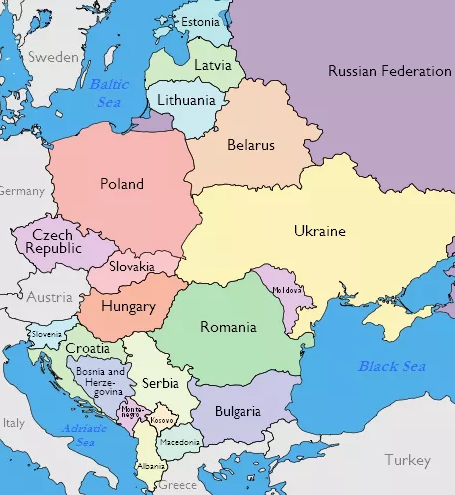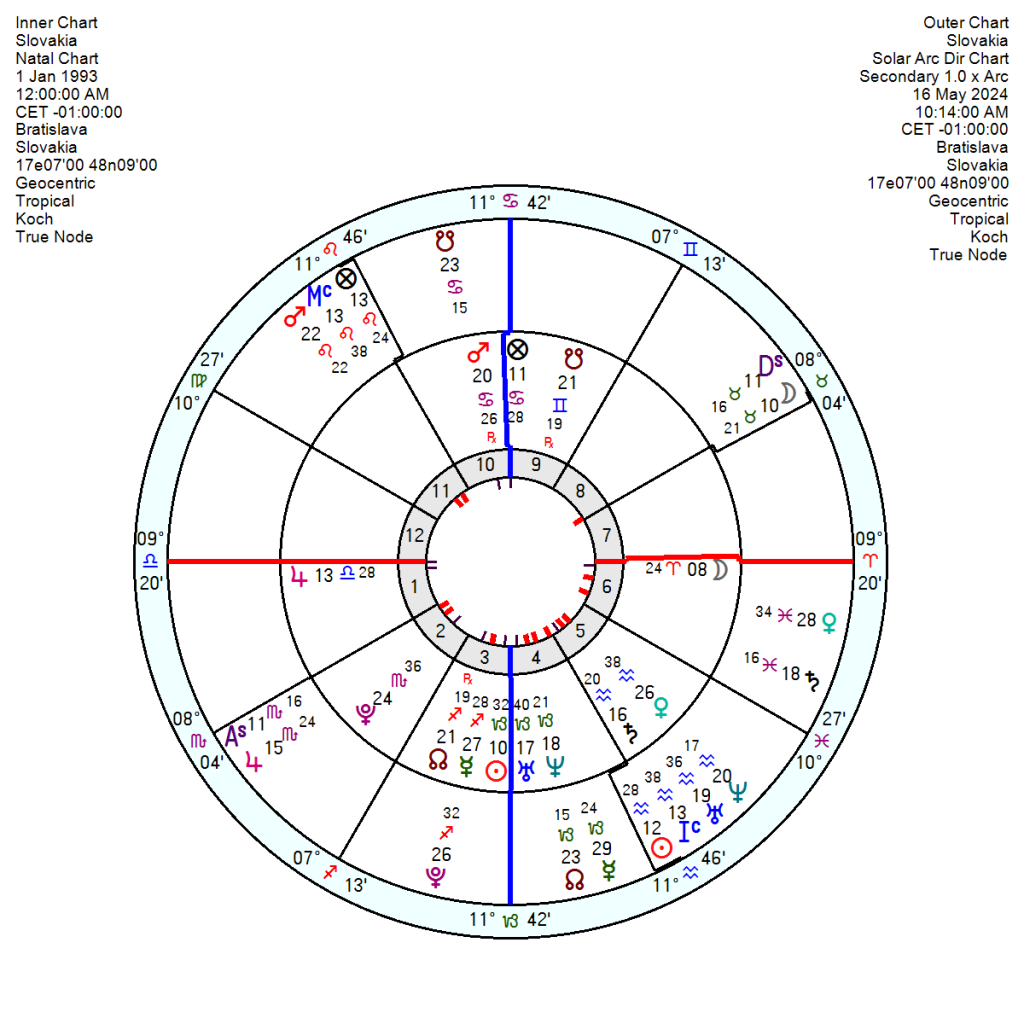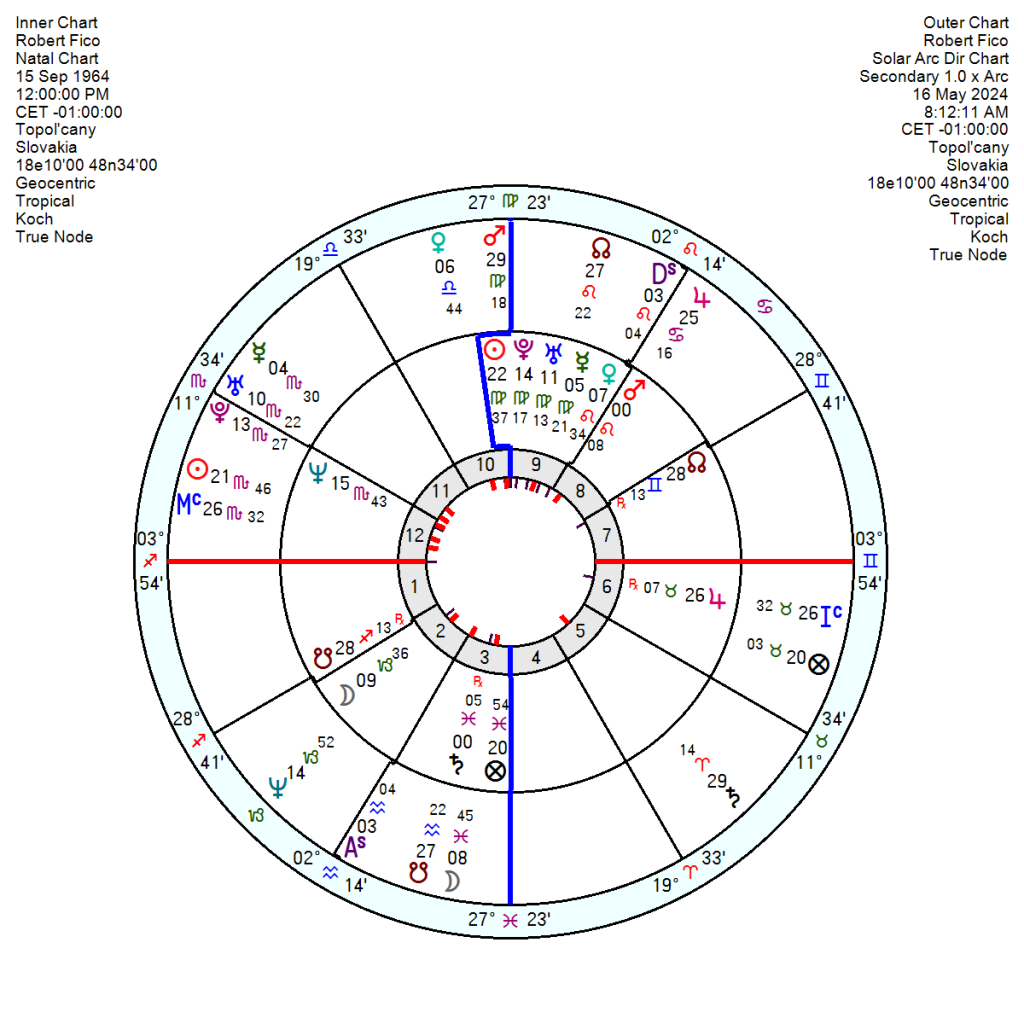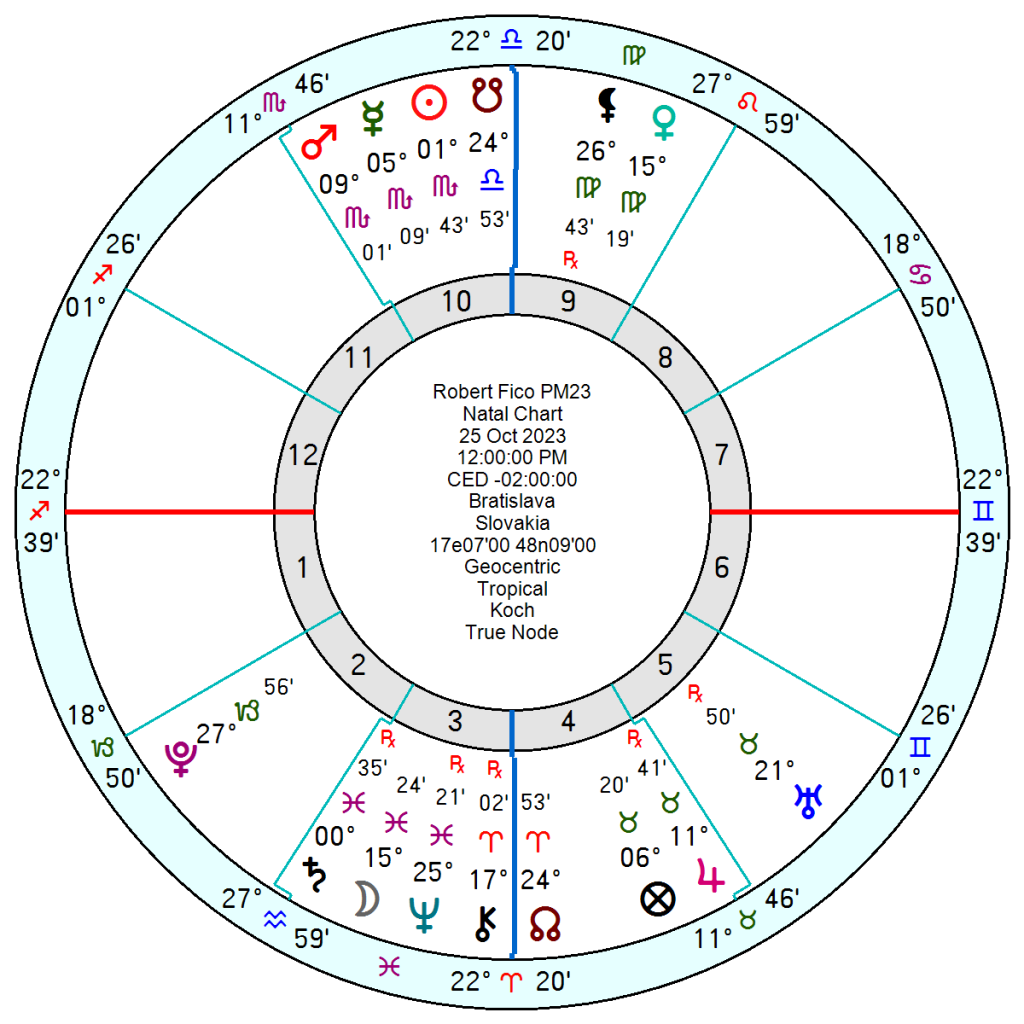



Slovakia is in turmoil after an assassination attempt on its pro-Russian prime minister, Robert Fico, by a disturbed, possibly politically-motivated pensioner. Slovakia is a landlocked country in Central Europe, bordered by Poland, Ukraine, Hungary, Austria and the Czech Republic from which it split in 1993. A developed country with an advanced high-income economy, it is a member of the EU, the UN, NATO and other European groups.
Slovakia, 1 January 1993 12 am Bratislava, has an expansive, go-ahead Jupiter on the Ascendant with a volatile, ambitious Mars in Cancer in the 10th opposition a highly-strung, can-be-fanatical Uranus Neptune in Capricorn. Mars is also trine a money-minded Pluto in the 2nd house of finances with Pluto in an unyielding square to Saturn. It is a tough chart with a propensity for violence. Transiting Uranus is exactly square the Solar Arc Mars now and moving to oppose the Pluto within weeks, on and off into early 2025 which will cause unrest, though it is a battened-down country which won’t de-stabilise easily. The SA Mars then moves to square the Pluto by 2026 which suggests significant trouble ahead, financially and in terms of risk. The country looks to be hemmed in at that point.
Robert Fico, 15 September 1964, has been prime minister on and off since 2006, being ousted in 2018 after corruption allegations and the murder of a journalist investigating his ties to a Mafia cartel. Despite the accusations, he bounced back in 2023, on a pro-Russia campaign, insisting on no military support for Ukraine with opinion polls suggesting a third of Slovaks believe the war was provoked by the West.
He is a Sun Virgo conjunct Pluto with Uranus, Mercury also in Virgo. His Mars in flamboyant Leo is inconjunct his Saturn for a hard-edged temperament. He also has the Boris Johnson Jupiter in indulgent Taurus widely opposition Neptune.
Exactly now he has tr Uranus square his Mars/Pluto midpoint which Ebertin describes as ‘violence, brutality, disasters or calamities of great consequence.’
He has been under pressure this year with tr Pluto opposition his Mars for a caged in, scary mood, running on and off into the New Year. With 2026 stacking up to be a meltdown year. He has survived but will no doubt be a long time in recovery.
His 25 October 2023 Term chart has been edgy since the start with Saturn trine a Sun, Mercury, Mars collection in Scorpio.

Thinking about the turmoil of the late 80’s and early 90’s, with the break up of the USSR and apparent end of the Cold War, I noticed the potential sensitivity of the late Fixed degrees. And wondered about tr Uranus, now moving along through the later degrees of Taurus, towards it’s rendezvous with Mars and Algol in July. There are quite a number of national and historical charts that may be sensitive to this. A few thoughts –
The waxing square between Pluto in Scorpio and Saturn in Aquarius in their previous cycle seems relevant. The squares were 25 Aquarius/Scorpio in March 1993, 24 degrees in October, and 27 in January 1994.
In November, 1918, at the end of the First World War, Uranus at 23 Aquarius opposed Saturn, 27 Leo.
When building began for the Berlin Wall, in 1961, Uranus was 25 Leo, conjunct the Nodes, 27 Leo/Aquarius.
For the Treaty of Paris in 1990 at the end of the Cold War, the Sun was 26 Scorpio.
The August Full Moon in Aquarius is 27 degrees, square Uranus in Taurus. Although ‘only’ a Full Moon, it may be significant this summer in marking some sort of culmination perhaps. Or shining a light again on the upheavals of the early 1990’s.
Does the astrology show whether the assassination attempt will have an impact on the pro-Russiam government? Or unsettle or destabilize it? Or even prop it up? There are some questions about the motives and contradictions about the ideology of the would-be assassin.
Thanks for any additional insight. My instinct tells me there’s going to be more, not less political violence in the coming years.
@ Nicole Spurs Larson,
according to El Pais News, Robert Fico’s attacker is a 71 year old poet named Juraj Cintula and he’s actually affiliated with pro-Russian and far-right ultra-nationalist groups in Slovakia.
Cintula apparently has a history of racism and xenophobia. He despises Slovakia ethnic Roma minority, opposes immigration, and he’s recently expressed a strong anti-Ukraine sentiment.
I think it’s ironic that Robert Fico, who is also a racist, misogynist, Russophile and member of the far-right himself would be attacked by someone from his own team. However, if I’m not mistaken, the motive for the attack had something to do with Robert Fico recently capitulating to EU demands and allowing aid to be sent to Ukraine.
All in all, I think it’s ridiculous that any European person could be against Ukraine or the Ukrainian People. The war is happening in their own backyard.
Thanks, Chris. I had heard that bio of the attacker on NPR, but Fico’s government was saying his politics were hostile to Fico. He may not be “pure” enough. It’s happened before.
True, we are living in an era where crazy people are demanding litmus tests and purity from their representatives
There was a conjunction of the Moon and fixed star, Regulus yesterday, apparently visible according to the astronomy blog I follow. I wondered about the significance of that in connection to assassinations or assassination attempts in general.
Slovakia is relevant to Québec, where I live, for two reasons. First, as a longtime hockey fan, I am old enough to remember that Czechoslovokia was a force to be respected. Its teams were second only to those of the Soviet Union in the Eastern bloc, and sometimes defeated them in intense battles with political overtones. It turns out all their great players were Slovak and some were later quite successful in professional hockey in North America. At this very moment, one of the top players in the world hockey tournament currently held in Europe is a young Slovak who is a star for the Montreal Canadiens. Second, for a Québec separatist such as myself, the peaceful separation of the Czechs and the Slovaks in 1992, by consensus but without a referendum such as those held in Québec and Scotland, through the exercise of parliamentary sovereignty and rational negotiation which have apparently not left much rancour and were nonetheless irreversible, is a model being increasingly considered in Québec, where the separatist party has a ten-point lead in the polls.
@ Andre,
I was a preteen in 1992 when the so-called “Velvet Divorce” took place in the former Czechoslovakia. I find it interesting that Czechoslovakia was one of the few countries behind the “Iron Curtain” were the transition of power and separatist movement manifested peacefully. The separatist movements in former Soviet and Yugoslav Republics like Georgia, Moldova, Tajikistan, Bosnia and Herzegovina, Croatia, Slovenia, and Kosovo turned into destructive civil wars.
By the way, I also support an independent Québec.
Re: “the peaceful separation of the Czechs and the Slovaks in 1992, by consensus but without a referendum such as those held in Québec and Scotland, through the exercise of parliamentary sovereignty and rational negotiation which have apparently not left much rancour and were nonetheless irreversible, is a model being increasingly considered in Québec”:
Comparing the break-up of Czechoslovakia with the break-up of Canada if Quebec declares itself independent could not be more inappropriate.
Czechoslovakia was only created in 1918 as the Austro-Hungarian Hapsburg Empire was falling apart and its many subject peoples were able to declare independence and form new countries. No country was destroyed to create Czechoslovakia. It wasn’t even formed in Europe! Its creation was the result of the Pittsburgh Agreement, forged by the huge, ex-pat, Czech and Slovakian communities in the United States under the leadership of Tomas Masaryk who became the country’s first president.
In contrast, Canada is a country which has grown organically from its first European colonies beginning in Quebec in the early 1600s, forged from a handful of British ex-colonies (including British-conquered Quebec or “Lower Canada” as it was called then) and eventually expanded into the second largest country in the world with French language rights protected “from sea to sea”.
The first time that a European conquering country did not require its citizens to change their religion was in Quebec when the British did not require its Catholic subjects to change their religion to Protestantism. Ironically, in present-day Quebec, religious intolerance in the name of “secularism” means that citizens wearing religious symbols or clothing cannot be employed by the government. This issue never came up when Christians wore cruxifixes or Jewish men wore kippahs. Rather, Quebec’s anti-religious symbols legislation emerged to target the turbans of orthodox Sikhs and especially the hijabs of Muslim women. At least one, hijab-wearing Muslim woman lost a teaching job as a result. This violates the Canadian Charter of Rights and Freedom which includes freedom of religion but no federal politician wants to “upset” Quebeckers by challenging this intolerance! Extra ironic is the fact that nuns wearing habits were a fixture in the hospitals and schools of Quebec through most of its history.
Meanwhile, the Quebec government’s ever more draconian, anti-English language measures against the shrinking minority of English-speaking citizens is a “polite” form of ethnic cleansing of Anglo-Quebeckers by making life so miserable for them and making them feel so unwelcome in their own province that they are leaving in ever more numbers. Which underlines how intolerant and narrow an independent Quebec would be because that’s how Quebec inside Canada has become.
Andre, I love and appreciate your contributions to Marjorie’s wonderful site. However, Quebec separatists are delusional if they think that destroying Canada by ripping out its centre will be easy — with Quebec getting the best deal out of the break-up.
What’s to prevent bilingual Montreal from also declaring independence from a ruthlessly French-centric, independent Quebec?
What’s to prevent the Indigenous peoples of vast northern Quebec from declaring independence from, again, a ruthlessly French-centric independent Quebec? I understand that there’s not a lot of support for Quebec independence among those northerners. Given how much of Quebec’s wealth derives from hydro power channelled via electrical lines passing through wilderness, consider how vulnerable those lines would be to sabotage by Indigenous separatists!
Why should the heart-broken, bitter citizens of destroyed Canada play anything but hardball with the new country of Quebec? Joint Quebec-Canadian passports so Quebeckers can work in Canada (especially all those who work in the civil service in Ottawa?) In your dreams!
Arguably a more important question for Quebec separatists is the reaction of the Americans. I doubt that the break-up of Canada would be welcomed in the short-term. Political instability on the Americans’ huge northern flank is the last thing they need.
Long-term, it could be good for the Americans if chunks of Canada sue to join the U.S. and the lower states get access to our water and other resources. But how would that be good for Quebec?
It’s been said that Quebec being within Canada has saved its French culture from going the way of Louisiana’s French language and culture: quaint, good for local tourism but certainly without language protections. An independent Quebec of 8.8 million would be in an English-speaking sea of 373 million in the rest northern North America. Spanish language and culture is of far greater importance in the U.S. where as many as 57 million speak it. NAFTA has joined Canada to the 100 million Spanish speakers of Mexico. An independent Quebec would have to negotiate its own inclusion into NAFTA. How much clout would Quebec have against the rest of Canada, the U.S. and Mexico?
Meanwhile, Quebeckers already have a foretaste of the French language’s irrelevance to the rest of North America. Because of new, French-only packaging requirements, some American manufacturers have given up selling to Quebec entirely, thus limiting consumer choices in the province.
If Quebec opts for independence, it will be so messy and destructive for Canadians and Quebeckers that our collective standards of living will fall even more than they have under Justin Trudeau’s government. If the split-off portions of Canada sue to become part of the U.S., Quebec won’t be far behind. Then good luck getting language rights protected ahead of Spanish-speaking Americans!
A well thought out argument Cathy thank you for an intelligent summary of issues… makes a nice change to read persuasive, informed opinion.
Much obliged! And pardon the typos and misspelling! I really want Quebec to stay part of Canada — and to stop abusing human rights for the sake of protecting “pure laine” Quebec culture.
To quote Wikipedia: “The French term pure laine (lit. ’pure wool’ or ‘genuine’, often translated as ‘old stock’ or ‘dyed-in-the-wool’), refers to Québécois people of full French Canadian ancestry, meaning those descended from the original settlers of New France who arrived during the 17th and 18th centuries.
Chapeau!
I hate Robert Fico with a passion. He’s a horrible person.
Give it a rest Chris. Your personal likes and dislikes are irrelevant in the grand scheme of things and have no place on an astrology forum.
My apologies. My comment was a knee-jerk reaction.